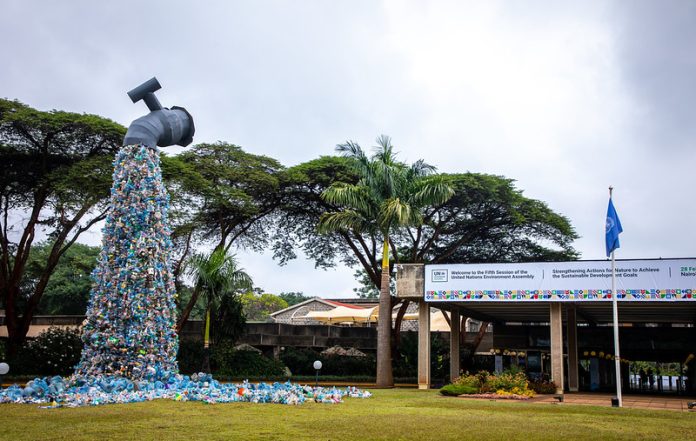For the first time, the international community has agreed on a framework to curb the world’s growing plastic problem.
A resolution adopted Wednesday by the United Nations lays out an ambitious plan for developing a legally binding treaty to “end plastic pollution.”
“With plastic pollution getting worse every day, there is no time to waste,” said Rwandan Environment Minister Jeanne d’Arc Mujawamariya. “This decision is a historic milestone in the global effort to prevent our planet from drowning in plastics.”
Wednesday’s resolution came on the third day of the biennial UN Environment Assembly in Nairobi, where more than 150 countries are represented. It calls for the creation of an intergovernmental negotiating committee to hash out details of a treaty by the end of 2024.
“This is just an amazing show of what the world can do when we work together,” said U.S delegate Monica Medina, the assistant secretary of state for oceans and international environmental and scientific affairs. Choking back tears, she added, “It is the beginning of the end of the scourge of plastic on this planet. … I think we will look back on this as a day for our children and grandchildren,” she said.
“Today marks a triumph by planet earth over single-use plastics. This is the most significant environmental multilateral deal since the Paris accord. It is an insurance policy for this generation and future ones, so they may live with plastic and not be doomed by it,” said Inger Andersen, Executive Director of UNEP.
“Let it be clear that the INC’s mandate does not grant any stakeholder a two-year pause. In parallel to negotiations over an international binding agreement, UNEP will work with any willing government and business across the value chain to shift away from single-use plastics, as well as to mobilise private finance and remove barriers to investments in research and in a new circular economy,” Andersen added.
The committee’s mandate includes all phases of the plastic life cycle — from design and production to waste management. It comes at a time when the world produces billions of pounds of plastic waste annually — about 353 million tons in 2019, according to a recent report from the Organization for Economic Cooperation and Development, and amid mounting scientific concerns about issues such as marine plastic debris and the potential impact of microplastics.
Millions of tonnes of plastic end up in the oceans each year, leading to alarming images of turtles and other wildlife caught in the waste. Even Mount Everest has not escaped microplastics pollution. The United States contributes most to this deluge, according to a National Academy of Sciences study, generating about 287 pounds of plastics per person.
“The high and rapidly increasing levels of plastic pollution represent a serious environmental problem at a global scale,” noted the UN resolution, which also acknowledged “the urgent need to strengthen global coordination, cooperation and governance to take immediate actions toward the long-term elimination of plastic pollution.”
Some countries, states and municipalities have taken action to curb plastic waste.
Environmental activists and industry representatives alike welcomed the agreement. “It has all the critical components we thought were necessary at this stage in the process,” said Erin Simon, the head of plastic waste and business at the World Wildlife Fund. In a statement, the International Council of Chemical Associations, a trade association, wrote, “We commend the governments that spent long days finding common ground to develop a meaningful resolution to address plastic pollution.”
The UN resolution was years in the making, said David Azoulay, a lawyer at the Centre for International Environmental Law. He says he remembers the idea first surfacing at the 2016 iteration of the UN Environment Assembly in the context of marine plastic. “Envisioning a treaty was unthinkable,” Azoulay said. But, he added, Wednesday’s resolution has gone even beyond that early focus.
“The issue is not just plastic in the ocean; the issue is plastic pollution throughout its life cycle,” Azoulay said. “There is very little in there that I wish wasn’t in there. Everything we need to have the conversations that will lead to a good treaty is in there.”
Azoulay was glad that among the achievements in the resolution, its final version specifically charged the negotiating committee with looking at plastic production, included the option for a dedicated fund to help finance the treaty and mentioned human health impacts of plastic pollution.
“There were efforts to weaken the language on health that failed,” said Bjorn Beeler, the international coordinator at the International Pollutants Elimination Network, an advocacy and research group. Although he said he would have liked a more explicit mention of the chemical additives in plastics, that language was “negotiated out.” An aspect about which Simon is excited is the call for national action plans from each participating country. More harmonized and standard data is “critical,” she said but acknowledged that “the proof is in the action we take from here on out.”
Getting from resolution to treaty will not be easy. “The fact that they are headed toward binding rules I take as a very good sign,” said Steven Blackledge, who runs the conservation programme at the non-profit group Environment America. “The devil is in the details.”
The UN negotiating committee will have a multitude of specifics to wade through in a relatively short time. Among the many items, any treaty will have to tackle reporting standards, financing mechanisms and, perhaps the thorniest issue, plastic production. “The million-dollar question is how much we’ll talk about reducing the production of virgin plastic,” Azoulay said.
That topic is likely to prove contentious. Ahead of the conference, Joshua Baca, the vice president for plastics at the American Chemistry Council, the trade association for chemicals manufacturers, called restricting and regulating the production of plastic “a very shortsighted approach.”
With such major hurdles left to clear, Beeler said he is skeptical that the timeline will hold. “As you get into it, it’s going to be a monster. I don’t fathom how you can get a deal within two years,” he said. “This is meaningful; this is significant. But this is really the first step,” said Baca.
SOURCE: WASHINGTON POST/PACNEWS


















